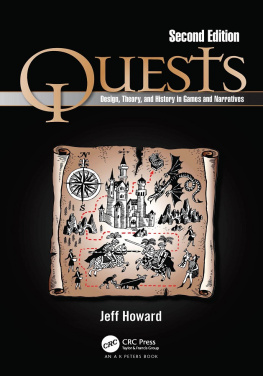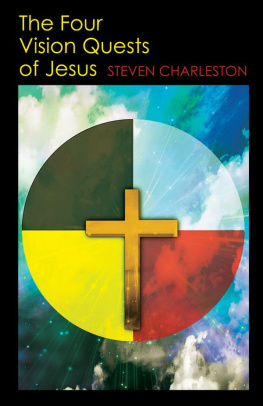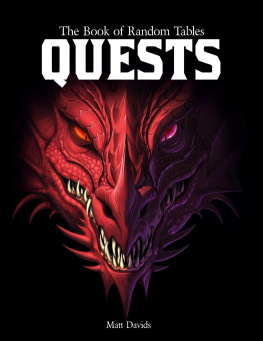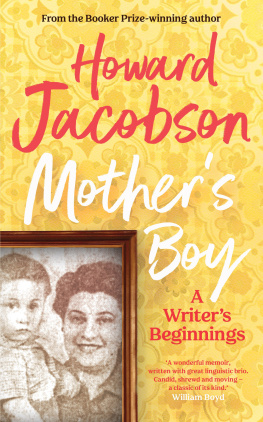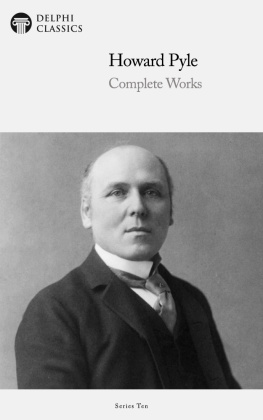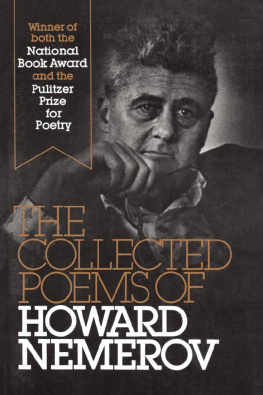Howard Jeff - Quests
Here you can read online Howard Jeff - Quests full text of the book (entire story) in english for free. Download pdf and epub, get meaning, cover and reviews about this ebook. year: 2022, publisher: CRC Press LLC, genre: Romance novel. Description of the work, (preface) as well as reviews are available. Best literature library LitArk.com created for fans of good reading and offers a wide selection of genres:
Romance novel
Science fiction
Adventure
Detective
Science
History
Home and family
Prose
Art
Politics
Computer
Non-fiction
Religion
Business
Children
Humor
Choose a favorite category and find really read worthwhile books. Enjoy immersion in the world of imagination, feel the emotions of the characters or learn something new for yourself, make an fascinating discovery.
- Book:Quests
- Author:
- Publisher:CRC Press LLC
- Genre:
- Year:2022
- Rating:3 / 5
- Favourites:Add to favourites
- Your mark:
- 60
- 1
- 2
- 3
- 4
- 5
Quests: summary, description and annotation
We offer to read an annotation, description, summary or preface (depends on what the author of the book "Quests" wrote himself). If you haven't found the necessary information about the book — write in the comments, we will try to find it.
Quests — read online for free the complete book (whole text) full work
Below is the text of the book, divided by pages. System saving the place of the last page read, allows you to conveniently read the book "Quests" online for free, without having to search again every time where you left off. Put a bookmark, and you can go to the page where you finished reading at any time.
Font size:
Interval:
Bookmark:

Combining theory and practice, this updated new edition provides a complete overview of how to create deep and meaningful quests for games. It uses the Unity game engine in conjunction with Fungus and other free plugins to provide an accessible entry into quest design.
The book begins with an introduction to the theory and history of quests in games, before covering four theoretical components of quests: their spaces, objects, actors, and challenges. Each chapter also includes a practical section, with accompanying exercises and suggestions for the use of specific technologies for four crucial aspects of quest design:
- level design
- quest item creation
- NPC and dialogue construction
- scripting.
This book will be of great interest to all game designers looking to create new, innovative quests in their games. It will also appeal to new media researchers as well as humanities scholars in the fields of mythology and depth psychology who want to bring computer-assisted instruction into their classrooms in an innovative way.
The companion website includes lecture and workshop slides, and can be accessed at: www.designingquests.com.
Jeff Howard is Senior Lecturer in the Games Academy at Falmouth University in Cornwall, where he specializes in occult, metal, and Gothic themes and mechanics in games.
Design, Theory, and History in
Games and Narratives
Second Edition
Jeff Howard

First edition published 2008
by CRC Press
6000 Broken Sound Parkway NW, Suite 300, Boca Raton, FL 334872742
and by CRC Press
2 Park Square, Milton Park, Abingdon, Oxon, OX14 4RN
CRC Press is an imprint of Taylor & Francis Group, LLC
2022 Taylor & Francis Group, LLC
CRC Press is an imprint of Taylor & Francis Group, LLC
Reasonable efforts have been made to publish reliable data and information, but the author and publisher cannot assume responsibility for the validity of all materials or the consequences of their use. The authors and publishers have attempted to trace the copyright holders of all material reproduced in this publication and apologize to copyright holders if permission to publish in this form has not been obtained. If any copyright material has not been acknowledged please write and let us know so we may rectify in any future reprint.
Except as permitted under U.S. Copyright Law, no part of this book may be reprinted, reproduced, transmitted, or utilized in any form by any electronic, mechanical, or other means, now known or hereafter invented, including photocopying, microfilming, and recording, or in any information storage or retrieval system, without written permission from the publishers.
For permission to photocopy or use material electronically from this work, access
Trademark notice: Product or corporate names may be trademarks or registered trademarks and are used only for identification and explanation without intent to infringe.
Library of Congress CataloginginPublication Data
Names: Howard, Jeff, 1978- author.
Title: Quests : design, theory, and history in games and narratives / Jeff Howard.
Description: Second edition. | Boca Raton : Taylor and Francis, [2022] | Includes bibliographical references and index. | Summary: Combining theory and practice, this updated new edition provides a complete overview of how to create deep and meaningful quests for games. It uses the Unity game engine in conjunction with Fungus and other free plugins to provide an accessible entry into quest design--Provided by publisher.
Identifiers: LCCN 2021052945 | ISBN 9780367686079 (hardback) | ISBN 9780367686048 (paperback) | ISBN 9781003138266 (ebook)
Subjects: LCSH: Video gamesAuthorship. | Quests (Expeditions) | Quests (Expeditions) in literature.
Classification: LCC GV1469.34.A97 H69 2022 | DDC 794.8/3dc23/eng/20211221
LC record available at https://lccn.loc.gov/2021052945
ISBN: 978-0-367-68607-9 (hbk)
ISBN: 978-0-367-68604-8 (pbk)
ISBN: 978-1-003-13826-6 (ebk)
DOI: 10.1201/9781003138266
Typeset in Palatino
by Apex CoVantage, LLC
A lot has changed since the first edition of Quests.
The book was written between 2005 and 2007, and published in 2008. Vanilla World of Warcraft had just been released, and MMOs were taking the world by storm, popularizing the notion of games with thousands of quests. As I argued throughout the first edition, a lot of these quests were of dubious quality, repetitive, and lacking much meaning (kill 10 wolves and bring me back their pelts). The first edition of Quests was written as a countercultural response to that design practice. As a counterforce to these trends, I invoked the historical, literary origins of quests (medieval romances like Sir Gawain and the Green Knight) and the ludic origins of quests in early computer games (like Ultima IV). By comparing the symbolic framework of correspondences in Sir Gawain to the computational virtue system of Ultima IV, I advocated for a holistic approach to quest design through all aspects of game design, expressed in five elements of quests (overall meaning, spaces, objects, characters, and challenges) with five corresponding practical skills (systems and narrative design, level design, object creation, NPC profile construction, and scripting/programming). The core of this argument remains the same.
But, like I say, things have changed. Theyve changed in the following ways:
- Procedurally generated quests in games like Dwarf Fortress and Moon Hunters
- Rich, complex, morally ambiguous quest lines embedded in cryptic, symbolic worldbuilding in games like Dark Souls, The Witcher 3, and Dragon Age Inquisition
- The genre of the evolving game (massively online, co-op friendly but not quite an MMO) in the vein of Path of Exile and Warframe
- Storytelling tabletop RPGs and board games with rich, complex, and often generated or generative quests and quest systems, such as Kingdom Death: Monster
Technology, in the form of the tools that we use to design games and quests, has also changed. The first editions practical exercises were in the Aurora Toolset from Neverwinter Nights: an engine which, while well-designed and still supported by a niche of modders, has now become outdated. Even at the time of writing, this engine required the purchase of Neverwinter Nights, making it somewhat restrictive to users. In the meantime, user-friendly engines like Unity are freely downloadable and widely used in independent development, and free middleware plugins like Fungus integrate with Unity to aspects of quest design (such as branching dialogue and scripting) much more accessible.
Tonally, there is also a shift. As the protagonist of the Christopher Nolan movie Tenet intones: We live in a twilight world. The darkness of an ongoing (at the time of writing) global pandemic, the possible rise of fascism, and environmental destruction have unleashed a world that (to use a fictional genre term) is grimdark, along with a black tide of grim games whose quests are rich, resonant, and very dark indeed. Whereas the prototypical quester of the first edition was Sir Gawain, the quester of our current moment might be Guts from the grimdark anime
Next pageFont size:
Interval:
Bookmark:
Similar books «Quests»
Look at similar books to Quests. We have selected literature similar in name and meaning in the hope of providing readers with more options to find new, interesting, not yet read works.
Discussion, reviews of the book Quests and just readers' own opinions. Leave your comments, write what you think about the work, its meaning or the main characters. Specify what exactly you liked and what you didn't like, and why you think so.

